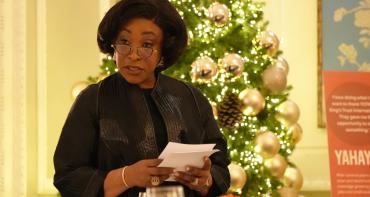The wellbeing of vulnerable people is being threatened by corruption in addition to Covid-19, the climate crisis and economic challenges.

The wellbeing of vulnerable people is being threatened by corruption in addition to Covid-19, the climate crisis and economic challenges.
The Commonwealth Secretary-General highlighted the impact of illegal practices such as fraud and bribery on top of these other serious issues as she addressed an anti-corruption training programme for the Caribbean.
Patricia Scotland said illicit financial flows cost developing countries around the world $1.26 trillion per year.
But if properly applied, this amount would lift above the poverty threshold the 1.4 billion people who get by on less than $1.25 a day - and keep them there for at least six years.
The Secretary-General said: “Our Caribbean region is confronted with the triple impact of pandemic, climate crisis, and serious economic challenges.
“On top of these, we must also tackle the no less injurious but perhaps more invisible scourge of corruption.
“Like the pandemic which countries are fighting to control, corruption inflicts huge human and financial costs, and puts in grave jeopardy the wellbeing of the most vulnerable.”
She added: “Corruption is a serious crime which undermines social and economic development in all societies.
“It affects education, health, justice, democracy, prosperity, and is one of the major impediments to achieving the Sustainable Development Goals.
“So there is a need for swift and decisive action to improve transparency and accountability, and to build confidence in the integrity of our institutions and systems.”
Virtual Centre for Excellence Series
The Secretary-General was speaking at the annual Virtual Centre for Excellence Series programme sponsored by the Commonwealth Secretariat and organised In collaboration with Grenada’s Integrity Commission and Department of Public Administration.
It brought together policy-makers and senior managers involved in tackling corruption in the region.
Grenada started to host training programmes in anti-corruption best practices for itself and the wider Caribbean in 2017.
This has enabled the Commonwealth Secretariat to build the capacity of Caribbean countries to deliver on their anti-corruption mandate.
Dr Roger Koranteng, Head of Public Sector Governance at the Commonwealth Secretariat, who led the training programme, said: “Since corruption risks are still with us, training in anti-corruption will continue to be a key component in addressing the menace.
“Anti-Corruption training ensures stakeholders are fully educated on what corruption is, the different forms it can take, the implications of committing corruption and how an offence can be reported.”
Anande Lady Trotman-Joseph, Chairman of Grenada’s Integrity Commission, added: “Our integrity commissioners and staff have been the recipient of world-class training by the Commonwealth Secretariat, through Dr Roger Koranteng.”
Sabrena Layne, of Grenada’s Department of Public Administration, said: “As developing countries continue to combat corruption, our challenges are quite significant as corrupt practices have become far more sophisticated in our technologically-driven world.
“It is even more important now that public officers are kept abreast with current and ongoing anti-corruption activities, information, best practices and are equipped with effective mitigation strategies.”
Commonwealth Caribbean Association of Integrity Commissions and Anti-Corruption Bodies
Across the Commonwealth, work to help fight corruption is delivered by the Secretariat through strategies of establishing regional anti-corruption agency networks and training centres to facilitate closer cooperation and learning.
For example, the Commonwealth Caribbean Association of Integrity Commissions and Anti-Corruption Bodies was created by the Commonwealth Secretariat in collaboration with the Grenada Integrity Commission.
This network has promoted collaboration and the exchange both of best practice and of practitioners among member countries in the region.
The Secretariat’s work has seen significant success, with data showing Commonwealth Caribbean countries are perceived as less corrupt than their non-Commonwealth neighbours.
Commonwealth Anti-Corruption Benchmarks
Commonwealth Anti-Corruption Benchmarks have also been designed to further help governments and public sector bodies.
They allow for anti-corruption laws, procedures and actions to be measured against international good practice.
The 22 benchmarks cover topics from sanctions for corruption offences to investigating and prosecuting authorities, and from political lobbying to disclosure of asset ownership.



